Rachel Zegler vs. "The Oscars"
How and why an Instagram comment sparked a fevered—but false—narrative of why a rising Gen Z star will be absent on Hollywood's biggest night
[Note: Roughly 12 hours after this was published, the Academy announced that Rachel Zegler would present at this year’s Oscars.]
With a stray comment on her Instagram, West Side Story star Rachel Zegler provided a spark.
Replying to one of her followers excited about her outfit for the Oscars, Zegler wrote “I’m not invited so sweatpants and my boyfriend’s flannel.” Her followers were outraged, and searched for an explanation, prompting Zegler to respond:
“Idk y’all i have tried it all but it doesn’t seem to be happening :’) i will root for west side story from my couch and be proud of the work we so tirelessly did 3 years ago. i hope some last minute miracle occurs and i can celebrate our film in person but hey, that’s how it goes sometimes, i guess. thanks for all the shock and outrage— i’m disappointed, too. but that’s okay. so proud of our movie.”1
What happened next has little to do with Zegler’s performance in West Side Story, for which she won a Golden Globe we can’t acknowledge and a National Board of Review award we can. Swiftly, the idea that Zegler was not invited to the Oscars ceremony became part of an ongoing narrative about ABC and the Academy’s mismanagement of the ceremony.

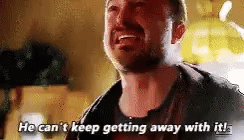
There’s also the additional, ongoing struggle to diversify both the Academy membership and the Oscar nominees and the optics of the Latina lead of a Best Picture nominee being conspicuously absent, as evoked here by One Day At A Time co-developer Gloria Calderón Kellett’s tweet that circulated in my feed on Sunday.

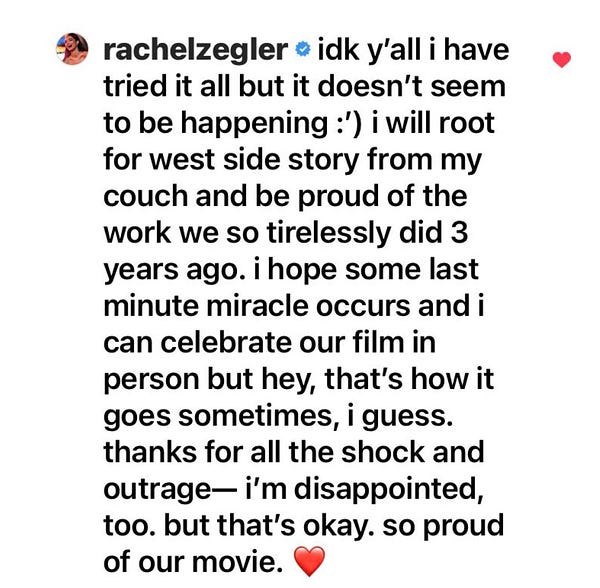
As the outrage moved along social media, the story took on a life of its own, spreading across every possible news outlet jostling for that sweet SEO slot for those googling why Rachel Zegler isn’t going to the Oscars (or who Rachel Zegler is, given how few people saw West Side Story).2 Overnight, Rachel Zegler not being invited to the Oscars was a flashpoint for the failings of the Academy, and by the time you read this the Powers That Be might well have acquiesced to public pressure to get her to Los Angeles on Sunday.
The truth, though, is that the framing created by this discourse is inherently false. Outside of nominees and presenters, one is not “invited” to the Oscars by the Academy: studios get tickets, and allocate them to associated talent as they see fit. But except for a Variety editorial that calls out Disney—the studio who released West Side Story after their purchase of 20th Century Fox—most folks seem content framing this as a failure of ABC (also owned by Disney) and the Academy, as though they have complete control of who and who is not present at the ceremony.
Now, admittedly, these tweets are primarily working solely off of Zegler’s Instagram comments, which frame it as an “invitation” and do not indicate who is responsible. It’s clear from the tone of Zegler’s official response to the outrage, posted to Twitter, that the situation is more complicated than the headlines.

However, in the absence of full details, the false discourse has continued unabated, framing this as a fundamental injustice instead of what it really is: a bleak reminder of Disney’s corporate overbearance and how it swallows all in its wake, as evidenced by how Zegler’s involvement in that film she’s lucky to be shooting in London is keeping her from cheering on her co-star’s Oscar win on Sunday.
Let’s make one thing clear: if there was a chance that West Side Story might win Best Picture, I expect that Rachel Zegler would have been given a ticket to the Oscars. Additionally, if the Golden Globes ceremony hadn’t just been (embarrassingly) tweeted and she had given a speech as the true embodiment of the Hollywood Foreign Press Association’s desire to crown young ingenues, she might well have earned the Oscar nomination that eluded her and this would all be moot. But West Side Story is not winning best picture, and she didn’t get to give that speech, or accept her NBR award in person.

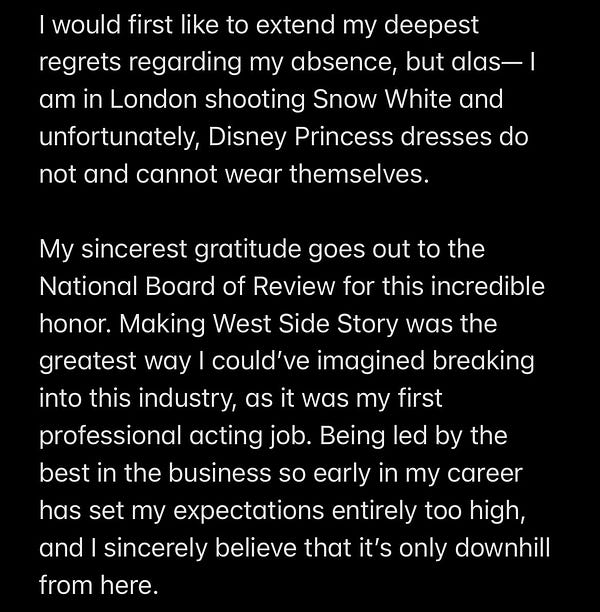
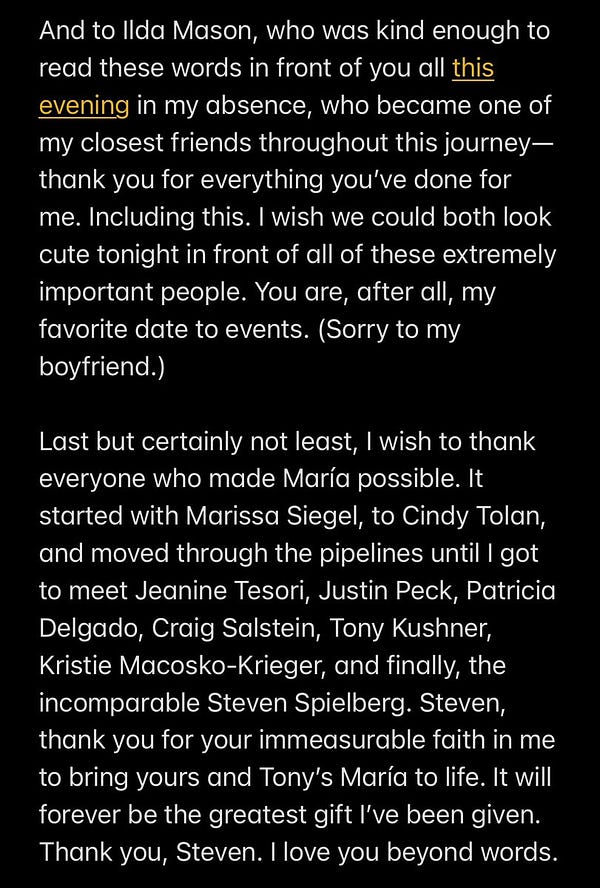
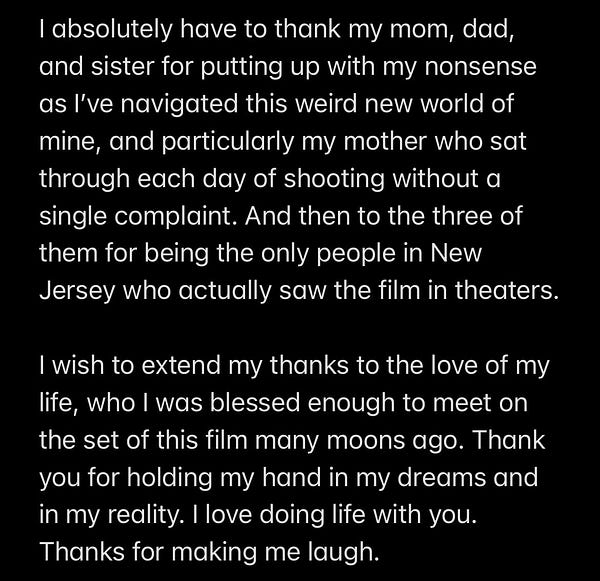
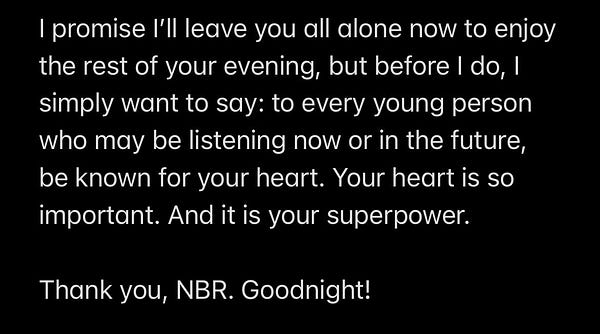
Zegler did, however, attend both the BAFTAs and the London location for the Critics Choice Awards, because those events were in the country where she is currently—as she notes in her NBR speech—playing Snow White for the very corporate overlords who have denied her a ticket to the Oscars ceremony.
It is here where the missing piece of the “Rachel Zegler not invited to Oscars” puzzle falls into place.3 If she had been nominated for an Oscar, Disney might have had an incentive to adjust the production schedule on the Marc Webb-directed reimagining of Disney’s first feature animated film so that Zegler could have made the trip to New York for the NBR Award ceremony. But once Zegler wasn’t nominated, her presence on the red carpets of this award season basically lost its value, and the “math” no longer added up. Why would Disney halt or reorganize production on a film for her to fly to L.A. to watch her movie lose, or to New York to win an award that isn’t a precursor to a more important award?
I want to be clear that this type of corporate cynicism baked into award season is odious, although admittedly the current reality of film production—as Zegler alludes to in her Twitter post—does mean this is a more complicated calculus than usual. If not for COVID, it’s possible that putting Zegler on a plane to New York/Los Angeles and then jetting her back to London would have been an easier proposition, but Zegler herself notes “we live in such unprecedented times,” and the logistics of making that work are likely extra complicated right now. But even then, it’s consistent with their corporate culture that even if not for COVID, Disney would be loath to fly Zegler across the ocean when there’s zero chance she’ll be joining her castmates on stage to celebrate West Side Story’s win in the night’s biggest category.
It’s bleak to think that an actress who starred in an Oscar-nominated movie doesn’t have value to the company that distributed it once it’s clear neither she nor the movie will be winning Oscars outside of Ariana Debose’s supporting actress lock, but things get bleaker when you dig into the other argument: that Zegler, as a future Disney princess, should be front and center at the ABC-produced Oscars ceremony regardless. On Twitter, user “Femme Critic” quote-tweeted my attempt to explain all of this to note that Disney is missing a critical opportunity to get their future start great publicity, which is true.


The problem is that Disney does not care about this. They are not invested in making Rachel Zegler a bigger star ahead of Snow White’s debut next year because Snow White is going to sell Rachel Zegler, and not the other way around. If Snow White makes Rachel Zegler a star, that’s great, but at this moment in time Disney has no investment in her getting publicity when her next film is from a competitor (the Shazam sequel, now debuting in December). Her value is to bring their coveted intellectual property to life, and if we’re being completely cynical the main part of her identity that is truly valued by Disney right now is the fact that she’s doing so as a woman of Colombian descent.
To be clear, I do not mean to suggest that Zegler was only cast because she is Latina—Webb and the film’s producers clearly value her as a performer, and West Side Story removed any and all doubt about her capability as an actress. But as an actress with one role to her name, her place in the corporate superstructure of the Walt Disney Company is purely about what she represents, and its place in Disney’s larger project of remaking its live-action movies in a new image.
Next year is a pivotal year for that project, with both the Halle Bailey-led Little Mermaid and the Zegler-led Snow White likely scheduled for release (the latter doesn’t have an official release date). And I’ll place money now that this time next year, Bailey and Zegler will take the Oscars stage together as presenters, their patter about the ground they’re about to break for women of color.
And while I believe there is value in that kind of representation, Kristen Warner’s concept of plastic representation hangs over this whole endeavor, and reminds us that such corporate commitments to diversity do not actually ascribe true value to the performers or characters involved. Zegler might make it to the Oscars in 2023, but to suggest this means Disney is invested in her career in its totality would be another failure in framing.
There’s a real “Who is Rachel Zegler and Why Are People Talking About Her” vibe to a lot of the headlines about this, and I imagine there’s some people reading those publications today wondering why the internet is all worked up about whether one actress attends an award show they don’t care about.
And while above I point to the existing pile-in of the academy and the very real racism of Hollywood as the fuel for this particular fire, another dimension to this story is that while Rachel Zegler is not a major celebrity, she is an extremely online one. She may have just made her feature film debut, but in the three years since they shot West Side Story Zegler has embodied Gen Z across social media platforms with confessional vlogs, YouTube covers, and a self-deprecating, earnest glimpse into her rising fame. She’s been open and honest about her struggles with her mental health, and cultivated the kind of authenticity that defines her generation’s celebrities.
And so an undercurrent of this moment is that Zegler’s lack of an invitation was made public through one such moment of authenticity: an interaction with a fan in Instagram comments, real talk-ing her disappointment and turning it into a moment of deglamorization. It’s also coming immediately after a weekend where her authentic self went to the BAFTAs, met Lady Gaga, and turned in a star-quality performance as Mike Faist’s date that the BAFTA social media feed turned into a whole narrative in its own right.
And while there is sadly nothing new about people of color struggling to both achieve and retain their place on the red carpet, there is something new about a Gen Z celebrity—albeit a fairly minor one in the grand scheme of things, with “only” 600k Instagram followers—being denied the opportunity to bring their followers along to Hollywood’s biggest night. I don’t think Disney is consciously excluding her because they don’t understand or respect the nature of her celebrity (although they most certainly do not), but the appearance of that exclusion is a dimension to the somewhat conspicuous level of outrage for the star of a movie that was a tremendous box office disappointment.
As such, I am not surprised that my own attempts to clarify the real forces behind Zegler’s non-attendance of the Academy Awards fell on deaf ears. Even if the real culprit here is Disney being unwilling to work around the Oscars in her production schedule, the dynamics of Zegler’s situation triggered so many different conversations that she has come to stand in for the Oscars’ lack of respect for films, their stars, and an entire generation.
And if they do in fact rectify this “injustice” and fly Zegler across the Atlantic (which would be lovely and deserved for someone who gave a great performance in a great movie), I hope we’ll remember that none of those problems will have been truly solved by her being in that crowd, or walking that red carpet.
I think I caught all of the autocorrect capital letters. As you’ll find later in this piece, her structured authenticity on social media is deeply important, and thus her lack of capital letters is vital if also excruciating for me to reprint on principle.
It’s on HBO Max and Disney+ right now, you really have no excuse if this is still you.




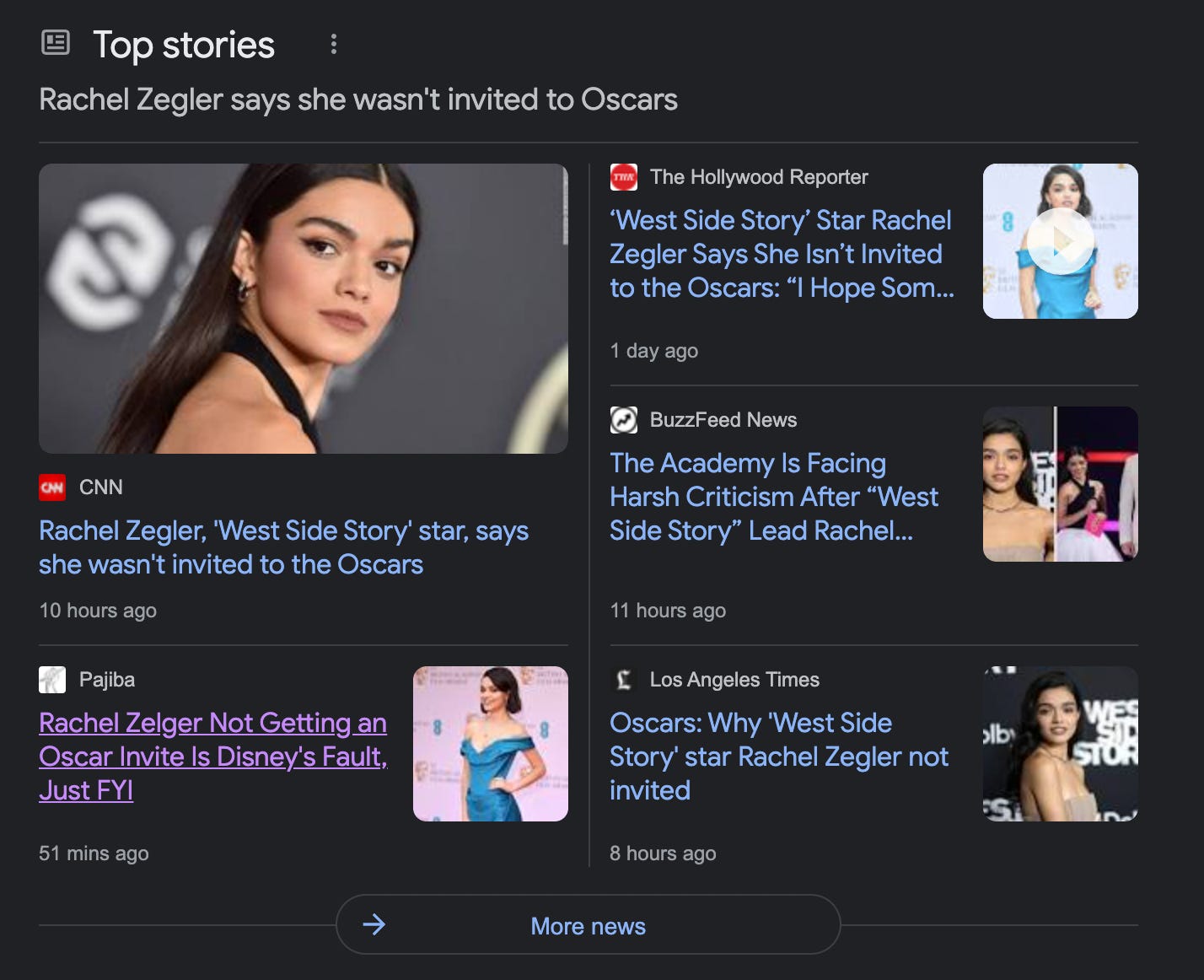
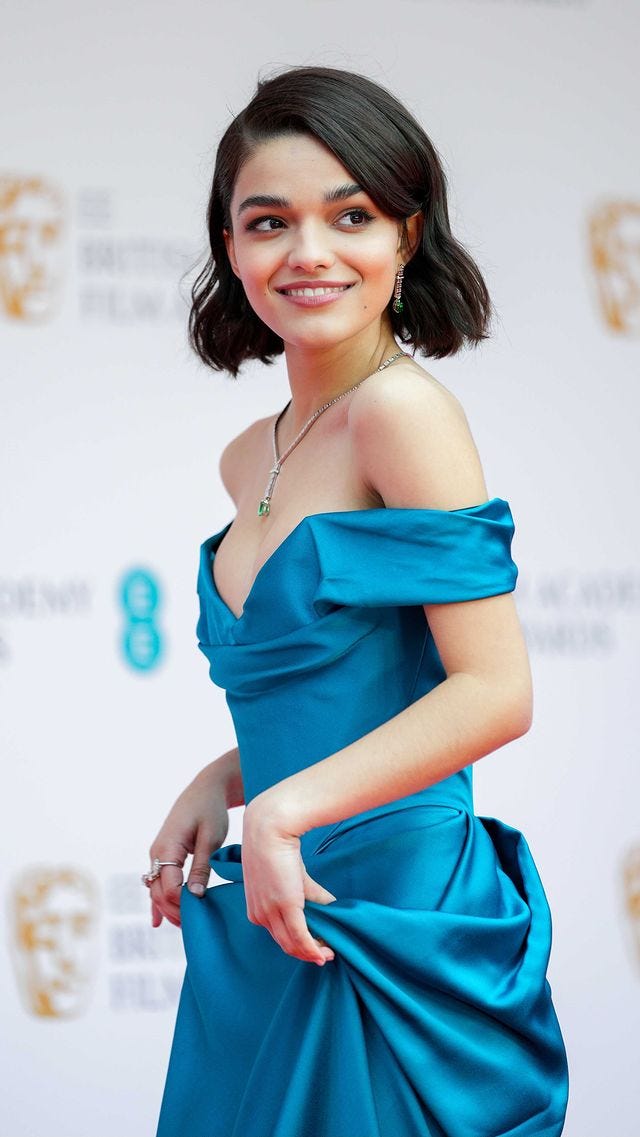
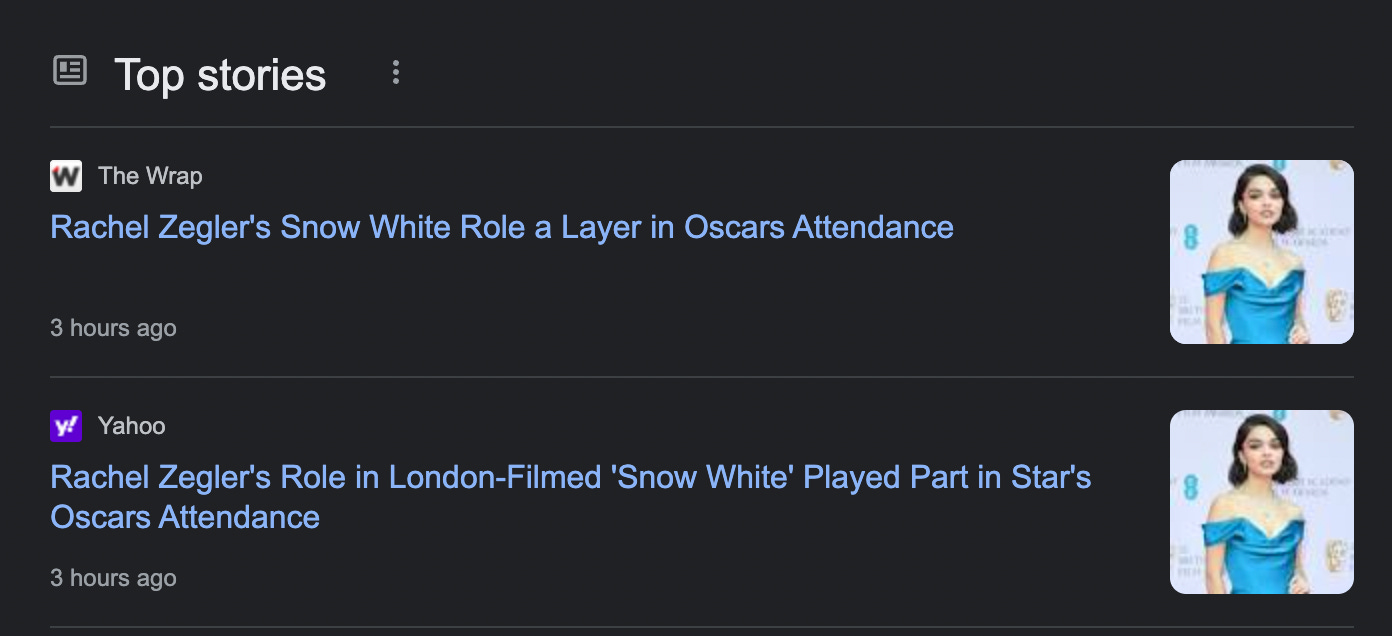
Will you be live-tweeting the Oscars?